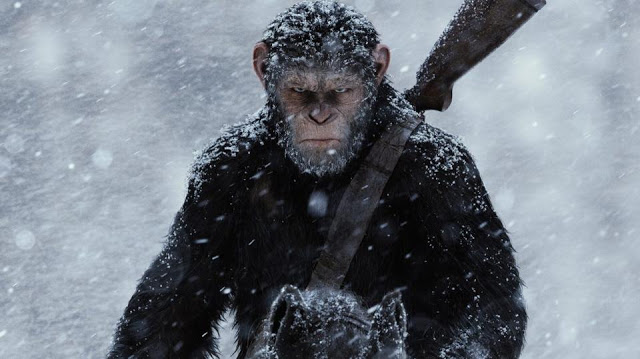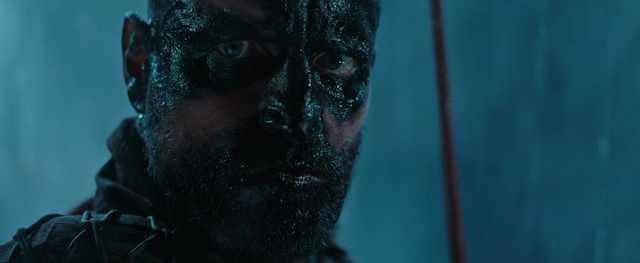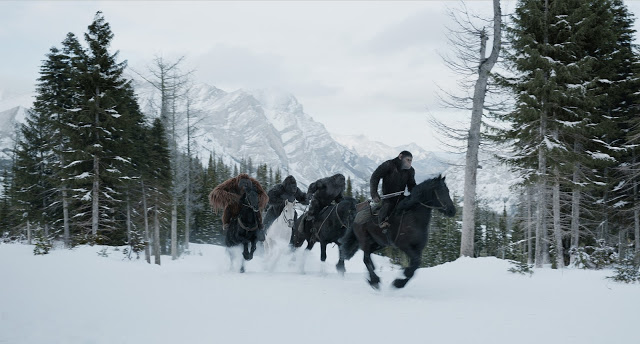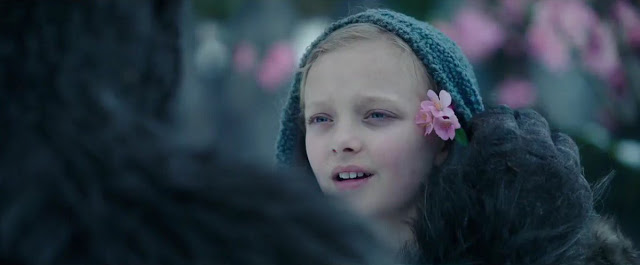Columns of soldiers goose-step in perfect rhythm, staring upward with reverence at their messianic leader. Behind them, enslaved prisoners, chained and starving, lug giant blocks of stone, piling them into a towering wall. A flag, emblazoned with religious symbolism, hangs firmly alongside an embankment, like gang colors marking territory. The loudspeakers blare an anthem, and the foot soldiers unleash a thunderous war cry.
You might think, from this bleak and jingoistic description, that I’m discussing a documentary on the Third Reich. But the anthem is “The Star-Spangled Banner”, and the flag is colored red, white, and blue. So when the leader orders his zealots to purge the world of an inferior race, he isn’t just marshaling his troops for battle. He’s putting America first.
Such is the chilling subtext of War for the Planet of the Apes, Matt Reeves’ tense, bracing new saga of conflict and community. As you can gather, the politics on display here are not exactly subtle, even if their allegorical impact may be more acute than intended. (Shooting took place well before the 2016 presidential election.) But while the film’s nationalist rhetoric and iconography may feel distressingly plausible, they are not the movie’s primary draw. No, what makes War for the Planet of the Apes so successful is that it’s a genuinely thrilling action movie, replete with exhilarating combat sequences and grand adventure. Had it been released ten years ago, it would still feel essential, getting both your blood pumping and—in more of a surprise—your tear ducts flowing.
Less surprising is the film’s technical sophistication. Over the past decade, Reeves has quietly established himself as a terrific genre director, beginning with the cult hit Cloverfield, which put a reasonably fresh spin on stale found-footage horror, and then ably remaking the Swedish vampire smash Let the Right One In (titled Let Me In). After Rupert Wyatt helmed the first entry of this old-but-new franchise (Rise of the Planet of the Apes, which was pretty good with its monkeys but pretty dull with its humans), Reeves stepped in for the sequel and instantly elevated the material. Dawn of the Planet of the Apes was an uncommonly thoughtful blockbuster, relying less on brute force than on character, texture, and craft.
He emphasizes those same elements this time out, but War for the Planet of the Apes is a far different movie—slower, riskier, and even more melancholic. Not that it is without excitement. The film’s opening act is essentially two set pieces threaded together, as a band of human troops snakes through the jungle, seeking to locate and demolish the camp of their simian enemies. (For those who need catching up on the franchise’s mythology: People got sick, apes got smart, and now they’re at war. Glad I could help.) The soldiers, aided by traitorous apes derogatively dubbed “donkeys”, move with hushed coordination and precision, and the same goes for Reeves’ camera. (His cinematographer is Michael Seresin, Alan Parker’s long-time lenser.) As the humans approach, Reeves efficiently maps out the parties’ relative positions—up there is a bridge, over there is a manned outpost—lending clarity to the chaos that follows. Once gunfire erupts, Reeves quickens your pulse, but he never relinquishes control; in a breathtaking flourish, he suddenly switches to an overhead shot that slowly pans across the forest, the camera looking down at the muzzle flashes and blood-soaked waterfalls like a mournful god.
The movie’s focal point remains Caesar (Andy Serkis, cinema’s motion-capture laureate), the intelligent chimpanzee who has grown, over the franchise’s trajectory, from James Franco’s clever pet into the grave, stoic leader of an entire civilization. Despite being a different species, Caesar is something of a humanist, and after the opening skirmish he releases a number of captives, informing them that the apes will cease hostilities if the humans simply leave them the woods. But shortly thereafter—in a gorgeous, ghostly sequence, as rain lashes down while bursts of bright-green tracer rounds penetrate the darkness—his wife and son are murdered in a raid led by the Colonel, the humans’ bloodthirsty commander (played with snarling commitment by Woody Harrelson). At this point, Caesar’s temperance turns to rage, and he vows to take revenge on this head-shaven warrior, even if it means forsaking the followers who cling to him for guidance.
War of the Planet of the Apes could have worked just fine as a continuous thread of similar battle scenes, but Reeves’ agenda is more ambitious. When Caesar sets off to kill the Colonel—first sending his brethren across a vast desert in a striking image that suggests a monkey diaspora—he is accompanied by three steadfast supporters: Maurice, a wise orangutan (Karin Konoval); Luca, an imposing gorilla (Michael Adamthwaite); and Rocket, a fellow chimp (Terry Notary, who recently played a much larger ape in Kong: Skull Island). As this primate quartet ventures through a series of beautifully desolate landscapes, War for the Planet briefly becomes a kind of road picture, as these not-so-easy riders encounter new people and face new challenges. In particular, they discover an abandoned young girl (Amiah Miller, making an impression), as well as a recluse chimpanzee who self-identifies as Bad Ape (Steve Zahn, straddling the line between funny and annoying). The former can’t talk (and by the way, 2017 has been quite the year for mute female orphans), but the latter has information on the Colonel’s whereabouts, intel that Caesar greedily seizes on.
In addition to introducing some low-key comic alchemy into the mix—Bad Ape’s jitteriness makes for an amusing contrast against Caesar’s steadfast drive—these new arrivals help underscore the existential quandary that afflicts War for the Planet’s protagonist. The central kick of the Apes franchise has been a sort of zero-sum game of morality; as the apes grow smarter and more human, the humans become more savage and animalistic. So when Caesar resolves to assassinate the Colonel at any cost, is he not sinking to the depths of his reviled adversary? This explains why he’s plagued by hallucinations of Koba (Toby Kebbell), the warmongering lieutenant whom he brutally clashed with in Dawn. Perhaps he’s losing his humanity, as Koba did, or maybe it’s worse—perhaps he’s becoming human.
Yet Caesar’s internal turmoil is nothing compared to his actual fate once he comes face-to-face with the Colonel, at which point War for the Planet transforms into a bona fide prison movie, a suspenseful caper in the tradition of The Great Escape and Stalag 17. Here, Reeves demonstrates his talents on multiple fronts. As Caesar schemes with his cohorts to liberate both himself and his caged colleagues, Reeves conveys the crucial logistical information (where to dig a tunnel, how to evade a fence) without resorting to clumsy exposition. But the prison scenes also acquire startling thematic force, depicting the horrors of a military state that displays callous hatred for an entire people on account of their otherness.
This intensity makes War for the Planet powerful, but the movie is always a pleasure to watch, especially for Reeves’ gift for delivering memorable moments. Rather than divulge details, I’ll simply note that a number of unremarkable objects—a tattered doll, a burning flag, a rope suspended in the midnight sky, a cherry blossom—serve as the basis for scenes both gripping and devastating. Credit must also go to Reeves’ crew: Weta Digital’s motion-capture work remains astonishingly convincing, serving the story rather than upstaging it, while the film’s overall sense of grandeur is amplified by Michael Giacchino’s operatic score, the prolific composer’s finest work since 2009’s Star Trek.
“Look at your eyes,” the Colonel says to Caesar with a mixture of admiration and alarm. “Almost human.” Technically, he’s correct: Those eyes are of course a combination of Weta’s special-effects wizardry and Serkis’ own nuanced acting. But in the context of War for the Planet of the Apes, his assessment is more troubling than even he realizes. In the majestic, frightful universe that this movie conjures, “almost human” is far too human already.
Jeremy Beck is the editor-in-chief of MovieManifesto. He watches more movies and television than he probably should.




